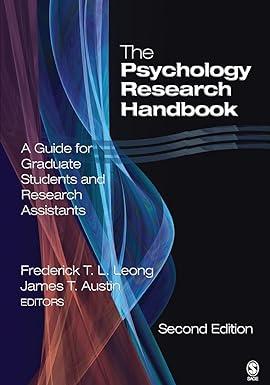2. Using Magazines As indicated in the chapter, newspapers and magazines can also be a good source...
Question:
2. Using Magazines As indicated in the chapter, newspapers and magazines can also be a good source of research ideas. You can undertake this exercise by using either the print version or the Web version of Psychology Today. For our illustration, we will describe the Web version. Go to Google and type in “Psychology Today” as your search term and follow the link to the magazine’s home page (Note: we could provide the actual URL but this may change in the next month or a year down the road). Once you are at the home page, you can click on the current links and then follow your natural tendencies, pursuing whatever current topics seem to interest you.
Using the current links (November 28, 2004), I followed the story entitled “Surviving Holiday Hell,” which indicated that people become unhappy during the holidays because they create expectations that the holidays should be perfect. Because that seldom occurs, many people suffer unfulfilled fantasies and expectations. The idea that caught my eye was the notion that people expected the holiday event to be perfect. Therefore, I went back to the home page and searched for perfectionism and found more articles to read. The story “Surviving Holiday Hell” may lead you to track down other leads. Whatever interests you from the first article, you can always search the terms further on that Web page. Just keep following the leads until you come to a puzzle that you find so personally meaningful that you would like to research further.
Besides following the latest links or stories on the current Web page of Psychology Today, you can also use the established links. On the left frame of their Web page, you will find a list of topics. You can start there and keep following your natural tendencies. For example, if the topic of relationships interests you and you click on that link, you will find about 65 specific topics to explore. Let us assume that the topic infidelity intrigues you.
You click on that link, which takes you to about half a dozen articles, columns, and quizzes related to infidelity.
You can then follow those links to see what aspects of infidelity might be worth researching. I followed the link entitled “Beyond Betrayal: Life after Infidelity” and found that the author had classified infidelity into those that were “accidental, romantic, marital arrangements, and philandering.” The idea of “philandering” intrigued me and given my interest in personality, I am going to explore if research has been conducted to examine the relationship between personality type (e.g., Big Five model) and philandering.
Your interests will probably take you down a different path, but go ahead and start with Psychology Today and see where the exploration takes you.
Step by Step Answer:

The Psychology Research Handbook A Guide For Graduate Students And Research Assistants
ISBN: 108851
2nd Edition
Authors: Frederick Leong, James Austin






